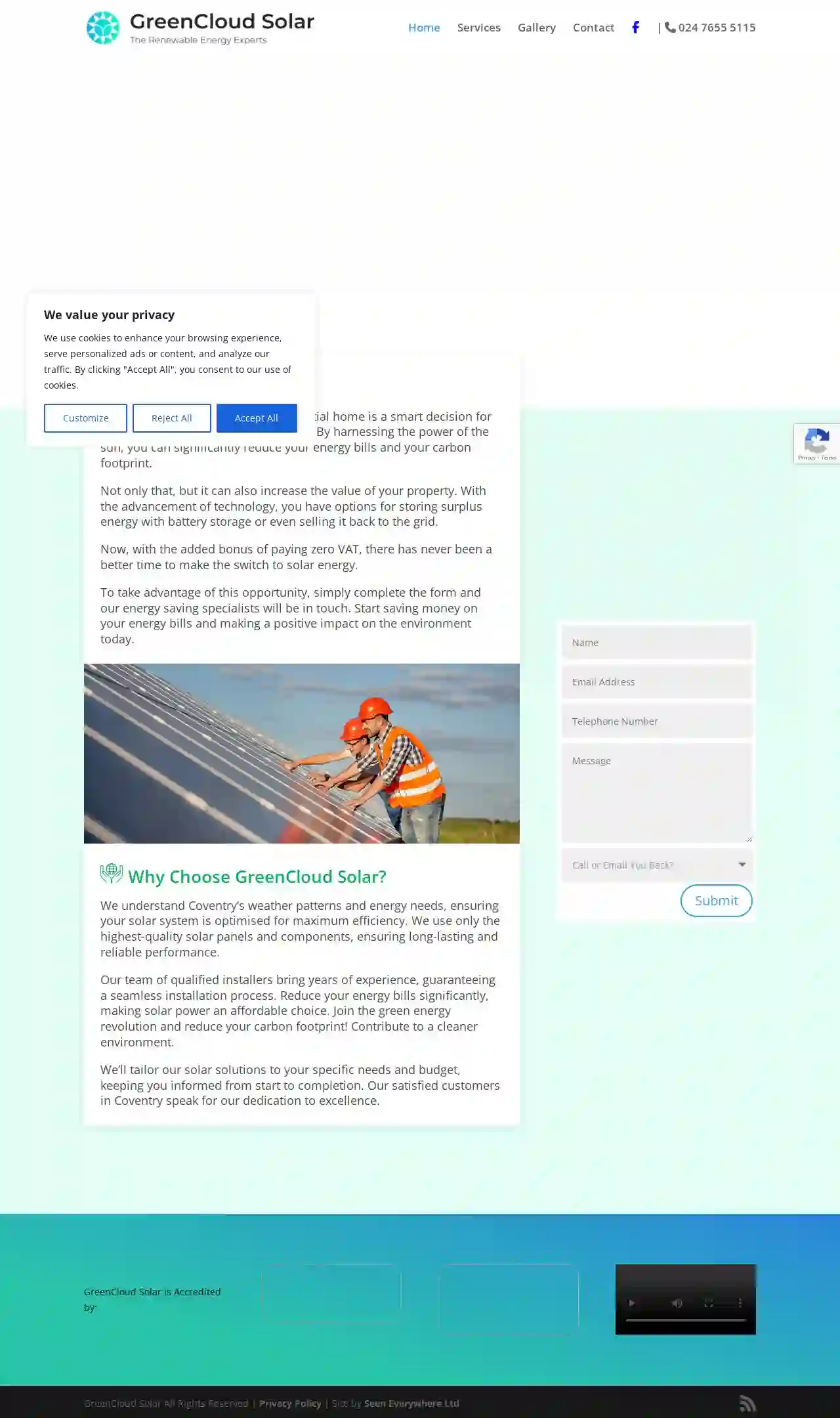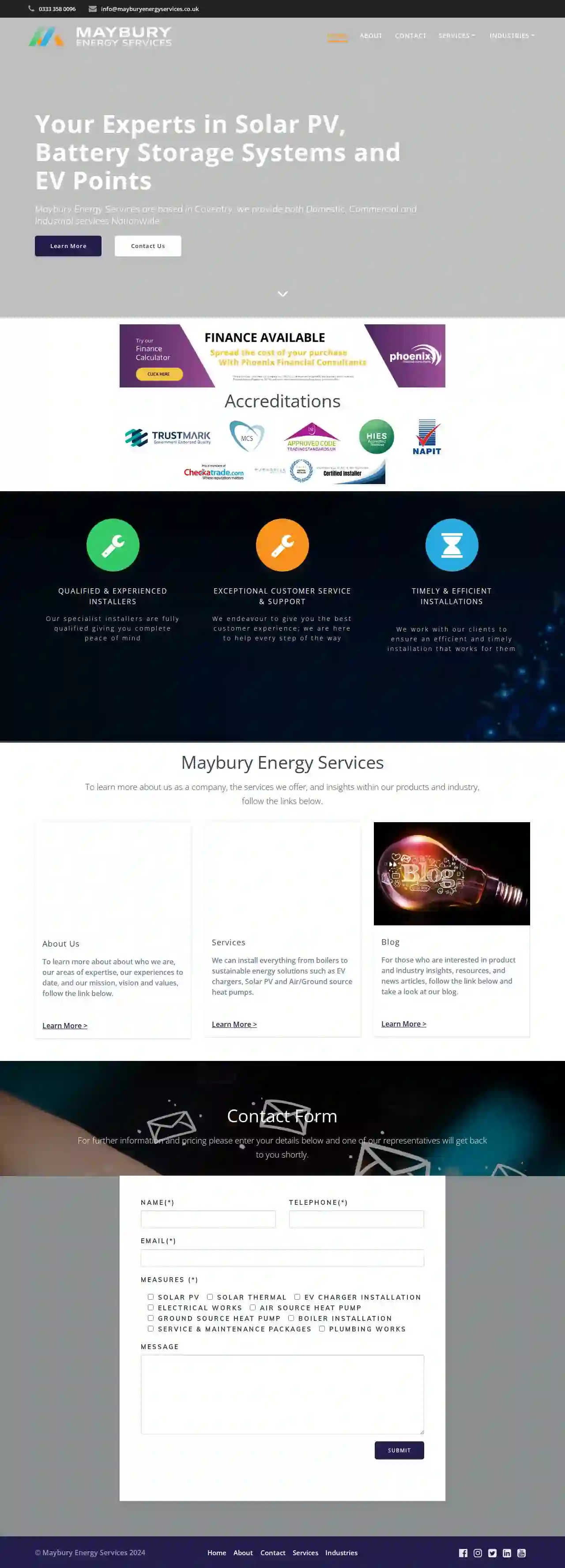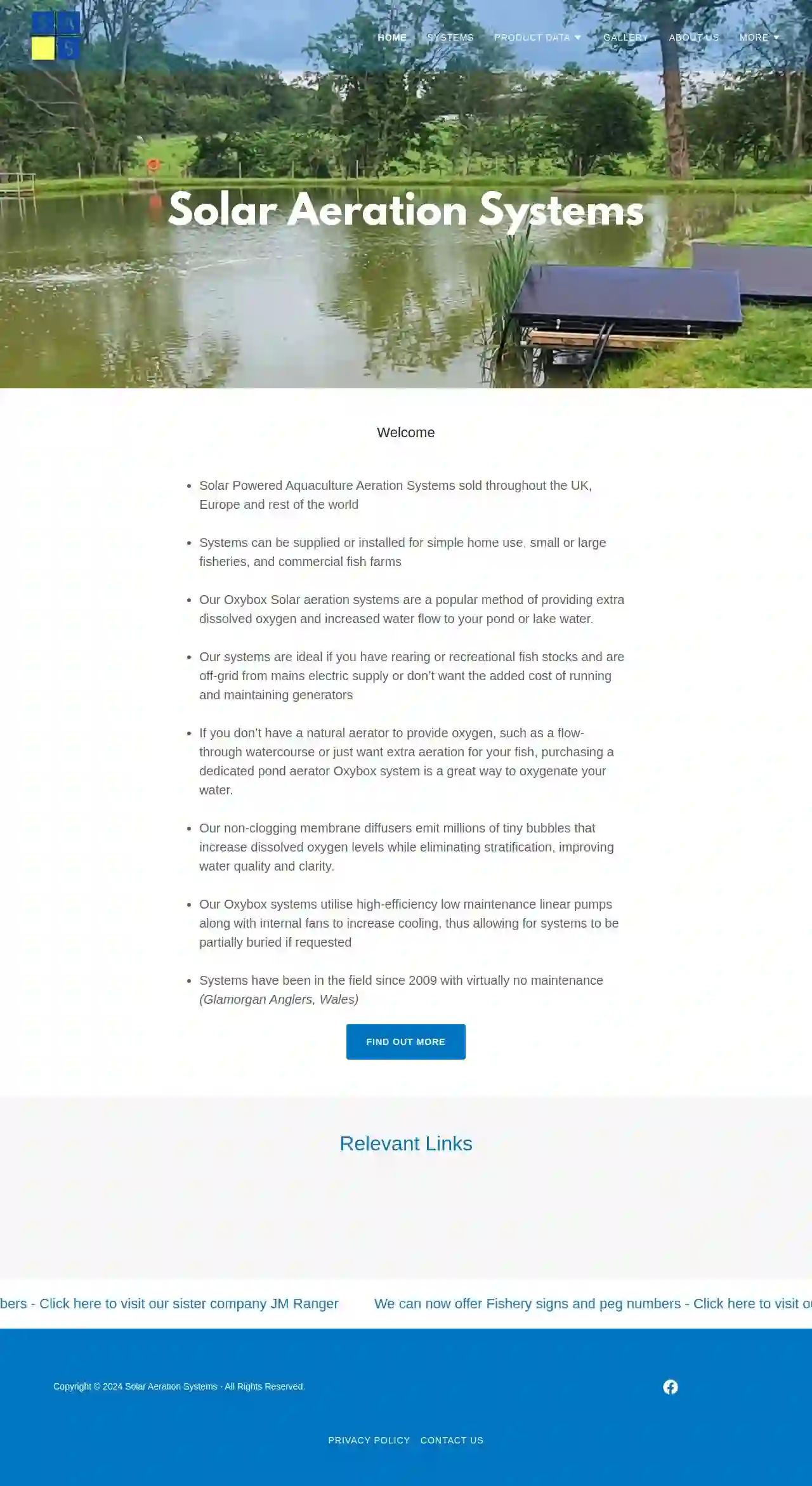Solar Installers Kirby Muxloe
Find the best Solar Installation Companies in Kirby Muxloe
Get multiple Solar Panels For Homes quotes for your project today! Compare profiles, reviews, accreditations, portfolio, etc... and choose the best offer.

Coventry University
4842 reviewsPriory Street, Coventry, CV1 5FB, GBCoventry University is a global Education Group with a reputation for equity and innovation. We offer a wide range of exciting courses, from undergraduate to postgraduate, and online learning opportunities. Our research is challenge-led and innovation-focused, and we have a strong track record of creating better futures for our students, colleagues, partners, and stakeholders.
- Services
- Why Us?
- Gallery
Get Quote
GreenCloud Solar Ltd
Unit 1, Coventry Business Park, Coventry, CV1 2NT, GBWelcome to GreenCloud Solar, a leading provider of solar panel installation and support services in Coventry and surrounding areas. Our mission is to help homeowners and businesses reduce their energy bills and carbon footprint by harnessing the power of the sun. With years of experience and a team of qualified installers, we offer a range of services including solar panel installation, maintenance, and repair. Our goal is to provide our customers with a seamless and efficient experience, from initial consultation to installation and beyond. We are committed to using only the highest-quality solar panels and components, ensuring long-lasting and reliable performance. Our satisfied customers in Coventry speak for our dedication to excellence.
- Services
- Why Us?
- Accreditations
- Gallery
Get Quote
MTG Energy Solutions Ltd
58 reviewsNottingham, GBMTG Energy Solutions is a local, reliable and qualified electrician with a specialism in renewable energy systems. We provide clean solutions across the UK, which not only save you money but also help the planet too! As experts in renewable energy solutions, we are trained and qualified to install and advise on the best aftercare for your solar panels. We're accredited installers of safe, reliable electric vehicle charging points. We work with your specific requirements to increase your energy stability. Our solutions for you include solar panels, battery storage, and commercial & industrial electrical services. We're not just an install team... We'll survey, report, design, manage, install and maintain. So whether you just want to know what costs are possible for you or you want a complete end-to-end service, we can cater for your requirements.
- Services
- Why Us?
- Accreditations
- Gallery
Get Quote
Air Quality Solutions
16 Commerce Square, Nottingham, NG1 1HS, GBAir Quality Solutions Ltd is a team of IAQM certified air quality consultants dedicated to helping planners, developers, and architects navigate the complexities of air quality regulations and secure planning permission for their projects. We offer a comprehensive range of air quality assessment services, from free baseline assessments to detailed dispersion modelling and impact assessments. Our expertise extends to emission mitigation strategies, dust management plans, and air quality neutral assessments, ensuring compliance with the latest environmental standards. We understand that air quality is a critical consideration in modern development, and we are committed to providing our clients with clear, concise, and actionable advice. Our innovative AQ Tool streamlines the assessment process, making it faster, more efficient, and cost-effective for everyone involved. Whether you are planning a small residential development or a large-scale infrastructure project, Air Quality Solutions Ltd has the expertise and experience to help you achieve your goals while minimizing your environmental impact.
- Services
- Why Us?
- Accreditations
- Our Team
- Gallery
Get Quote
Maybury Energy Services Ltd
11 reviewsCoventry, GBMaybury Energy Services are based in Coventry, we provide both Domestic, Commercial and Industrial services Nationwide. Learn More Contact Us Accreditations QUALIFIED & EXPERIENCED INSTALLERS Our specialist installers are fully qualified giving you complete peace of mind EXCEPTIONAL CUSTOMER SERVICE & SUPPORT We endeavour to give you the best customer experience; we are here to help every step of the way TIMELY & EFFICIENT INSTALLATIONS We work with our clients to ensure an efficient and timely installation that works for them Maybury Energy Services To learn more about us as a company, the services we offer, and insights within our products and industry, follow the links below. About Us To learn more about about who we are, our areas of expertise, our experiences to date, and our mission, vision and values, follow the link below. Learn More > Services We can install everything from boilers to sustainable energy solutions such as EV chargers, Solar PV and Air/Ground source heat pumps. Learn More > Blog For those who are interested in product and industry insights, resources, and news articles, follow the link below and take a look at our blog. Learn More > Contact Form For further information and pricing please enter your details below and one of our representatives will get back to you shortly. Name(*) Telephone(*) email(*) Measures (*) Solar PV Solar Thermal EV Charger Installation Electrical Works Air Source Heat Pump Ground Source Heat Pump Boiler Installation Service & Maintenance Packages plumbing Works message Δ © Maybury Energy Services 2024
- Services
- Why Us?
- Gallery
Get Quote
KUMOJA
57 reviewsCoventry, GBKumbaDirect.com is a trading website of Sortfast Ltd. Registered in England and Wales Reg. No. 13086039, 20-22 Wenlock Road, London, N1 7GU. All prices include VAT. Credit subject to status and affordability. Terms & Conditions apply. Sortfast Ltd. trading as www.kumoja.com is a credit broker and not a lender. Kumoja is authorised and regulated by the Financial Conduct Authority (FCA). We ensure you get the highest quality equipment installed by skilled installers. Buy solar panels and packages with ease and flexibility, with options to pay later and spread the cost into monthly affordable payments. Our popular services include Solar, Boreholes, Home Appliances, and Building Supplies. Get in touch with us through WhatsApp or email for any questions or concerns.
- Services
- Why Us?
- Accreditations
- Gallery
Get Quote
Green Cabin Company
Mill Hill, Baginton, Coventry, CV8 3AG, GBThe Green Cabin Company is a business that supplies and installs renewable energy systems and designs and manufactures environmentally friendly outside buildings and structures. We are installers of Solar Photovoltaic and battery systems for domestic properties and off-grid buildings and commercial properties. We also install Solar Thermal systems for domestic hot water and swimming pools. Our cabins are unique and handmade, consuming fewer fossil fuels in operation and manufacture. We have helped build medal-winning Chelsea Flower Show gardens and were winners of the SME Coventry and Warwickshire Business Award 2017.
- Services
- Why Us?
- Our Team
- Gallery
Get Quote
Solar Aeration Systems
51 reviews6a Fir Tree Lane, Groby, LE6 0FH, GBSolar Aeration Systems is a company that specializes in providing solar-powered aquaculture aeration systems throughout the UK, Europe, and the rest of the world. They offer a range of products, including Oxybox solar aeration systems, which are designed to provide extra dissolved oxygen and increased water flow to ponds and lakes. The company has been in the field since 2009 and has a reputation for providing high-quality, low-maintenance products. They also offer a full product design service and have a unique project management system that minimizes risks and keeps clients informed throughout the design process.
- Services
- Why Us?
- Our Team
- Gallery
Get Quote
Willgen Solar
Church Farm, Wartnaby, Melton Mowbray, LE14 3HU, GBWelcome to Willgen Solar! If you are looking for a solar charger, off-grid CCTV, solar equipment or 12V lighting we would love to help! Here at Willgen we specialise in off-grid and solar power for marine, leisure and stable and barn lighting projects and have years of experience and knowledge to help you turn your solar ideas into reality. You can browse and buy many solar and off-grid power products such as wind chargers, batteries and off grid CCTV cameras here in our secure online shop. We also design and supply bespoke systems and kits for DIY installation so please get in touch if you require help with a solar power or solar lighting project. Willgen is owned and run by me, Bill Musson. When helping customers with bespoke systems, whether it's lighting for stables, car park lighting or a road sign, whatever it is, I apply my knowledge and experience to your situation to provide a tailored solution that will work effectively and reliably and in a way that requires you to have no technical input or understanding. You can count on Willgen for customised solar solutions delivered in a practical and dependable way and in a friendly and straightforward manner. Please take a look around our website and get in touch if you require any help or advice! Many thanks, Bill
- Services
- Why Us?
- Our Team
- Gallery
Get Quote
LJM Ltd
511 reviewsBessell Lane, Stapleford, NG9 7BX, GBAt LJM Solutions, we’re more than just a company; we’re architects of a sustainable future. We pride ourselves on being committed to: Exemplary Workmanship, Exceptional Customer Service, Exceeding Clients' Expectations. With rising energy bill concerns looming over thousands of homeowners and businesses, LJM is your trusted, MCS accredited, local solar panel installer with over 25 years of qualified experience for both residential and commercial settings.
- Services
- Why Us?
- Accreditations
- Gallery
Get Quote
Over 3,485+ Solar Installers in our network
Our solar contractors operate in Kirby Muxloe and surrounding areas!
SolarCompaniesHub has curated and vetted Top Solar Companies in and around Kirby Muxloe. Find a reliable business today.
Frequently Asked Questions About Solar Installers
- Contact SolarCompaniesHub: We make it simple to connect with reputable Solar Installers in your area.
- Get Free Quotes: Request free quotes from multiple installers to compare prices, systems, and warranties.
- Schedule a Site Assessment: A qualified installer will visit your property to assess your roof, energy needs, and discuss your goals.
- Review Your Proposal and Contract: Carefully review the proposed system, financing options, and warranties before signing a contract.
- Installation and Activation: Once the contract is signed, the installer will obtain necessary permits, schedule the installation, and activate your solar system.
How do I get started with solar panel installation?
Will solar panels work during cloudy days or at night?
What is the lifespan of solar panels?
Do I need planning permission to install solar panels in UK?
How do I get started with solar panel installation?
- Contact SolarCompaniesHub: We make it simple to connect with reputable Solar Installers in your area.
- Get Free Quotes: Request free quotes from multiple installers to compare prices, systems, and warranties.
- Schedule a Site Assessment: A qualified installer will visit your property to assess your roof, energy needs, and discuss your goals.
- Review Your Proposal and Contract: Carefully review the proposed system, financing options, and warranties before signing a contract.
- Installation and Activation: Once the contract is signed, the installer will obtain necessary permits, schedule the installation, and activate your solar system.